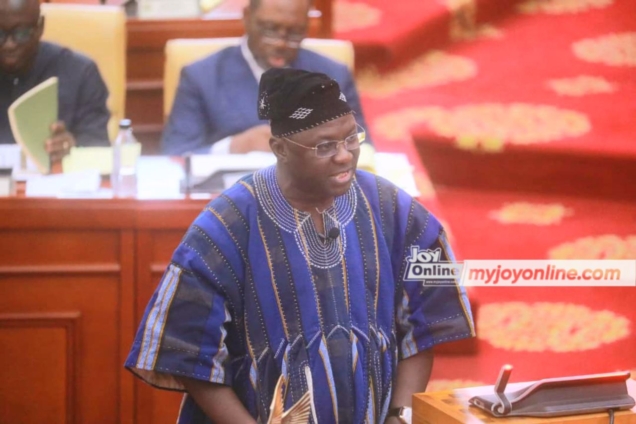The mid-year budget review presented by the Minister of Finance has left many Ghanaians perplexed and concerned. The revenue growth strategy outlined in the statement is a blot on wisdom, revealing an approach that is both retarded and unsympathetic to the business community and the ordinary Ghanaian. At a time when the economy is struggling, this strategy is likely to cause panic and drive up the prices of goods and services, to the detriment of consumers.
Ghana's economy operates largely as a pass-through cost economy. This means that any increase in taxes, fuel prices, or electricity tariffs is automatically passed on to the consumer.
The Minister's strategy, which involves the exaction of taxes and levies, fails to recognize this fundamental economic reality. Why are the taxpayers not honouring their tax obligations voluntarily? By imposing and pressurizing businesses, the government is inadvertently setting the stage for higher prices for goods and services. Doing business with your tax obligations up to 40% is a major concern. This will hit consumers hard, particularly those already grappling with the high cost of living.
Businesses in Ghana are already facing numerous challenges. High operational costs, coupled with a difficult economic environment, make it hard for many enterprises to survive, let alone thrive. The Minister's strategy of revenue growth through taxes and levies is a blow to these struggling businesses. Instead of providing support and creating an enabling environment for growth, the government is adding to their woes. This approach is not only short-sighted but also lacks empathy for the everyday struggles of business owners and entrepreneurs.
The impact on ordinary Ghanaians will be severe. As businesses pass on the increased costs to consumers, the prices of essential goods and services will rise. This will lead to a significant reduction in purchasing power, further exacerbating the economic difficulties faced by many households. In an already harsh economic climate, this strategy will only deepen the financial strain on the average Ghanaian.
It is imperative that the Minister of Finance reconsiders this strategy. The wisest course of action to bring relief to this tattered economy is to focus on reducing the cost of doing business. This can be achieved through measures such as lowering or suspension of certain taxes, providing subsidies for key industries, and improving infrastructure to reduce operational costs. By making it easier and more affordable for businesses to operate, the government can stimulate economic activity, create jobs, and ultimately increase revenue through growth rather than extraction.
Furthermore, efforts should be directed towards improving efficiency in public spending and addressing corruption. These steps will free up much-needed resources that can be used to support economic development and provide relief to citizens. By tackling waste and ensuring that taxpayer money is used effectively, the government can build public trust and create a more stable economic environment.
The Minister of Finance’s current strategy is a misguided attempt at revenue generation that overlooks the harsh realities faced by businesses and consumers in Ghana. It risks causing panic and driving up the cost of living, further burdening the ordinary Ghanaian. A more compassionate and pragmatic approach is needed. The government must focus on reducing the cost of doing business and improving public spending efficiency. This will provide immediate relief and lay the foundation for sustainable economic growth, benefiting both businesses and consumers.
The Minister's revenue growth strategy is not only ill-conceived but also unsympathetic to the plight of Ghanaians. It is time for the government to adopt a more empathetic and thoughtful approach to economic management. By creating an environment that supports business growth and reduces costs, the government can help steer the economy towards recovery and ensure a better future for all Ghanaians.
-
The Author, Enyonam Adzo Apetorgbor is an Investment Banker, Development Finance Analyst and CEO of Keta Investment Promotion Center.
Latest Stories
-
Ouattara will deliver despite Hearts of Oak’s jerky form – Frank Nelson
10 seconds -
NSA boss Ampofo Ankrah promises ‘200%’ effort despite meagre resources
15 minutes -
Sports & Recreation Ministry to investigate death of Nigerian boxer
28 minutes -
Crystal Palace forward ‘making lot of people proud’ with Nketiah inscription on shirt
31 minutes -
GPL 2024/25: Insatiable Ibrahim Tanko asks for more after Medeama see off Holy Stars
1 hour -
Lionel Messi’s bodyguard no longer on sidelines for Miami games
1 hour -
Bawumia supports Muslim community with over 3,000 bags of rice during Eid ul Fitr
2 hours -
“I Love You” may fuel domestic abuse in Ghana, KNUST researcher argues in new study
3 hours -
Today’s Front pages: Wednesday, April 2, 2025
3 hours -
AG engaging media on fight against corruption not wrong – Dr Osae Kwapong
3 hours -
Ntim Fordjour demands accountability for missing ECG containers amid National Security evacuation
3 hours -
Roads Minister orders commencement of works on Ashaiman-Afienya and Tema Motorway-Dawhenya stretches
3 hours -
Real Madrid reach Copa del Rey final after 8-goal extra-time thriller
3 hours -
Ports and pots: Vessels of trade, culture, and survival; a metaphorical and strategic exploration
3 hours -
Let’s be careful CJ’s removal process doesn’t become a political tool – Dr Osae Kwapong
3 hours

